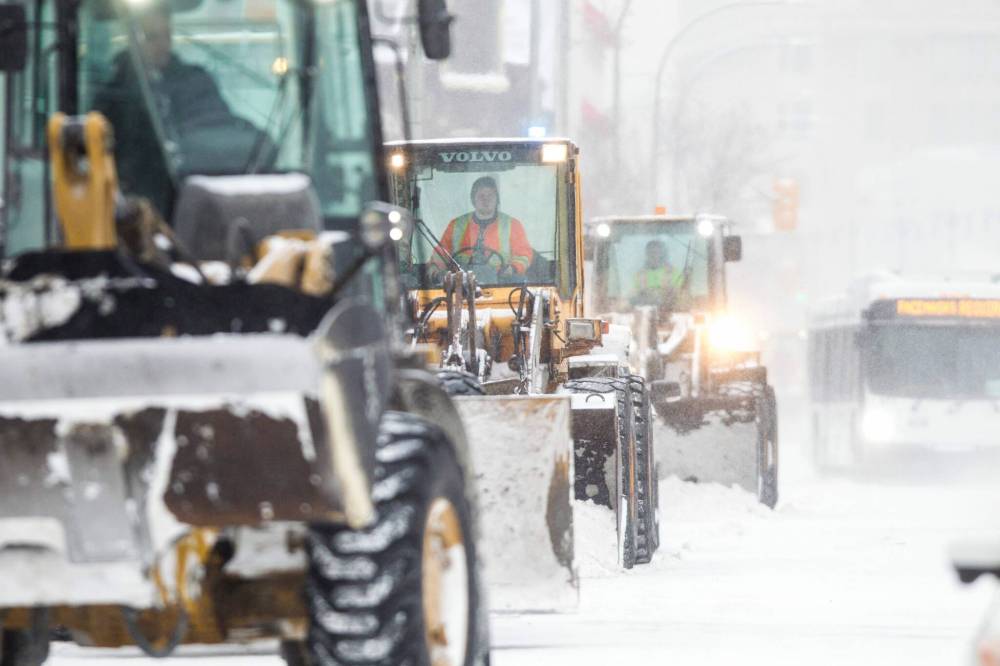Snow clearing bills weigh down city budget projections
Advertisement
Read this article for free:
or
Already have an account? Log in here »
To continue reading, please subscribe:
Monthly Digital Subscription
$1 per week for 24 weeks*
- Enjoy unlimited reading on winnipegfreepress.com
- Read the E-Edition, our digital replica newspaper
- Access News Break, our award-winning app
- Play interactive puzzles
*Billed as $4 plus GST every four weeks. Offer only available to new and qualified returning subscribers. Cancel any time.
Read unlimited articles for free today:
or
Already have an account? Log in here »
Hey there, time traveller!
This article was published 12/01/2022 (1147 days ago), so information in it may no longer be current.
The City of Winnipeg’s budget woes are piling up, with significant snowfall adding to pandemic losses.
The city now predicts a $17.9-million deficit for its tax-supported budget and a separate $3.5-million shortfall for Winnipeg Transit for the 2021 year, according to a financial update.
That includes a $4.6-million overrun for snow removal and ice control, which adds to the $35 million already budgeted for that work.

“We (had) this trio of factors in 2021 that are leading to the year-end deficit projection. There’s the increased costs of snow clearing, the increased pension costs the city is responsible for and the ongoing impacts of COVID-19. All three of these factors kind of came together in 2021 to result in a year-end deficit,” said Coun. Scott Gillingham, who heads council’s finance committee.
As previously reported, the city expects to pay $5.5 million to cover higher-than-expected police pension costs.
As a winter city, Gillingham stressed crews will continue to meet the standards of the Winnipeg snow clearing policy for safety reasons, despite the cost.
A finance report notes 30 centimetres of snow fell in November, or 10 cm beyond the five-year average for that month. At times, the snow also mixed with rain to create icy conditions.
While the city budget is based on the calendar year, the prediction reflects data up to Nov. 30. The cost to clear another 30 cm of December snow has not yet been factored in.
Coun. Kevin Klein believes council should set a higher snow clearing budget to prevent such shortfalls, since winter storms have often created sudden, unexpected bills in recent years.
“We know snow fluctuates from year to year… why aren’t we budgeting (more)? Then, if we’re under budget, why don’t we take that money and put it in a snow-clearing fund?” said Klein.
The councillor suggested such a change would soften the hit to city finances going forward.
“Now (we would) have that reserve for the future,” he said.
Gillingham said he’s hesitant to increase the snow clearing budget, however, since city surpluses have covered its overruns over the last five years. That budget was again set at $35 million for 2022.
“We would be required to either raise taxes or cut services elsewhere to increase the snow clearing budget when, most years, we’ve had a surplus at the end of the year (to cover it).”
Gillingham said COVID-19 pandemic costs are the key factor that will likely prevent a surplus from being available for that use this year, reflecting a public health emergency that won’t last forever.
“I don’t think it’s prudent to make long-term financial decisions based on the anomaly of a one-in-100-year global pandemic,” he said.
Meanwhile, COVID-19 continues to reduce revenues and ramp up costs for the municipal government.
While the city prepared for $61.2-million of pandemic costs and losses in 2021 (based on its multiyear 2020-23 budget), it now expects the final tab will wind up at $75.2 million. Transit alone is expected to lose $13 million more than first expected.
“So much right now is out of our control (at) the City of Winnipeg because it’s related to COVID-19 and the ongoing pandemic and… health orders,” said Gillingham.
For example, Transit ridership continues to average around 53 per cent of pre-pandemic levels, as many Winnipeggers continue to work and study from home. Transit is expected to cover its deficit through retained earnings, which largely paid for capital projects in the past.
Once all financial data is available for 2021, any remaining deficit will be covered by the city’s financial stabilization reserve (its so-called rainy day fund).
joyanne.pursaga@freepress.mb.ca
Twitter: @joyanne_pursaga

Joyanne Pursaga
Reporter
Born and raised in Winnipeg, Joyanne loves to tell the stories of this city, especially when politics is involved. Joyanne became the city hall reporter for the Winnipeg Free Press in early 2020.
Our newsroom depends on a growing audience of readers to power our journalism. If you are not a paid reader, please consider becoming a subscriber.
Our newsroom depends on its audience of readers to power our journalism. Thank you for your support.


